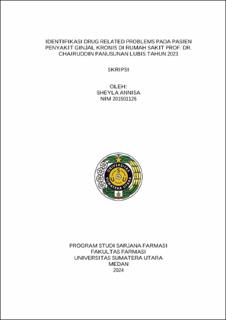| dc.description.abstract | Background: Chronic kidney disease (CKD) is an abnormality of kidney
structure or function, present for ≥ 3 months, with implications for health. The
high number of medications used by CKD patients can increase the potential for
Drug-Related Problems (DRPs) which can interfere with desired health outcomes.
Objective: This study aimed to determine the occurrence of DRPs in chronic
kidney disease patients admitted to Prof. Dr. Chairuddin Panusunan Lubis
Hospital in 2023.
Methods: This study was a descriptive retrospective cross-sectional study
conducted at Prof. dr. Chairuddin Panusunan Lubis Hospital. Data were obtained
from the medical records of CKD inpatients in 2023 (n=51). The sampling
technique used was total sampling. The occurrence of DRPs was identified based
on the Pharmaceutical Care Network Europe (PCNE) V9.1 classification, which
includes problems categories (P1-P3) and causes (C1-C6).
Results: There were 28 females (54.90%) and 23 males (45.10%), with an
average age of 46.8±11.5 years. The highest stage of CKD was stage 5 (78.43%).
The most common comorbid condition was anemia (84.31%), with the most
frequently used medication being antihypertensives in the Calcium Channel
Blocker class (88.24%). Among the 51 medical records, 21 (41,17%) showed the
occurrence of DRPs, consisting of 26 Problems (P) categorized under P1.
Treatment effectiveness (46,15%) and P2. Treatment safety (53,85%), and 26
Causes (C) categorized under C1. Drug selection (57,69%) and C3. Dose selection
(42,31%).
Conclusion: Drug-Related Problems (DRPs) occurred in chronic kidney disease
patients admitted to Prof. dr. Chairuddin Panusunan Lubis Hospital in 2023. | en_US |


